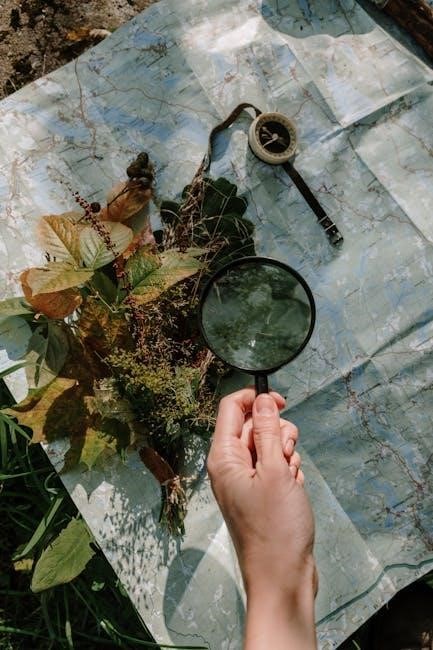A guide is someone who directs or assists others in navigating unfamiliar territories, whether physical, emotional, or professional. Guiden embodies the essence of leadership and support, providing clarity and direction in various contexts.
1.1 Definition and Overview
Guiden refers to a person or thing that provides guidance, direction, or assistance. It encompasses both physical and metaphorical navigation, offering support in unfamiliar territories. Whether as a noun or verb, guiden implies leading, advising, or showing the way. This concept is universal, applying to tourism, education, and personal growth. A guide ensures clarity, safety, and understanding, serving as a trusted source of knowledge and expertise. The role requires empathy, adaptability, and deep understanding of the subject matter.
1.2 Importance of Guidance in Various Contexts
Guiden plays a vital role in empowering individuals and groups across diverse settings. In education, it enhances learning and personal growth. In tourism, it ensures safe and enriching experiences. Professionally, it aids career development, while personally, it offers mentorship and emotional support. Guidance fosters clarity, confidence, and independence, making it indispensable in navigating life’s challenges and achieving goals effectively. Its universal application underscores its significance in fostering success and well-being across all aspects of life.

Evolution of the Term “Guiden”
The term “guiden” originates from Scandinavian languages, with roots in Old Norse and Norwegian, evolving to signify leadership and direction across cultures and historical contexts.
2.1 Etymology and Linguistic Origins
The term “guiden” traces its roots to Scandinavian languages, particularly Norwegian and Old Norse. It is derived from the verb “guida,” meaning “to guide” or “to lead,” reflecting its role in navigation and direction. Linguistically, it evolved from Proto-Germanic terms associated with movement and leadership, emphasizing the concept of assisting others in finding their way. Over time, its meaning expanded to encompass both physical and metaphorical guidance, becoming integral to various cultural and professional contexts.
2;2 Historical Use and Development
Historically, the term “guiden” reflects the evolution of guidance roles across cultures. In ancient times, guides were essential for navigation and safety, often leading travelers through unknown territories. During the Middle Ages, the concept expanded to include spiritual and educational guidance, with mentors guiding apprentices. Over centuries, the role of guides adapted to societal needs, transitioning from physical navigation to encompassing emotional, professional, and intellectual support. This evolution highlights the enduring importance of guidance in human development and exploration.

Definitions of “Guiden”
Guiden refers to a person or handbook providing direction, while as a verb, it means to lead or assist someone in navigating situations, offering clarity and support.
3.1 Guiden as a Noun
As a noun, “guiden” refers to a person who directs or assists others in navigating unfamiliar territories. This can include tour guides, mentors, or spiritual leaders. It also encompasses handbooks or guidebooks that provide essential information for various activities, serving as a resource for clarity and direction. The term emphasizes leadership and support, whether through human interaction or written materials, making it a versatile concept in both personal and professional contexts.
3.2 Guiden as a Verb
As a verb, “guiden” means to assist someone in moving or developing in a specific direction. It involves showing the way, controlling movement, or providing instructions. For example, “She guided us through the busy streets” or “He guided her firmly towards the sofa.” The term also applies to supervising or instructing, such as guiding someone through a complex process. It emphasizes leadership and direction, whether physical, emotional, or professional, making it a dynamic and essential action in various contexts.

Roles of a Guide
A guide leads, directs, and assists others in navigating unfamiliar territories, providing expertise, safety, and clarity. Their role ensures effective navigation and understanding in various contexts.
4.1 Tour Guides and Their Responsibilities
Tour guides are experts in local history, culture, and landmarks, leading groups to explore destinations. Their duties include explaining points of interest, ensuring safety, and managing logistics. They provide insightful commentary, answer questions, and enhance the overall experience. Guides may specialize in specific regions or themes, offering unique perspectives. Effective communication and organizational skills are essential, as they ensure a smooth and memorable journey for travelers.
4.2 Mentorship and Guidance in Personal Development
Mentorship is a form of guidance where experienced individuals provide wisdom, support, and direction to help others grow personally and professionally. Guides in this context assist in setting goals, developing skills, and overcoming challenges. They offer valuable insights, fostering confidence and resilience. Effective mentors create a supportive environment, encouraging self-reflection and informed decision-making. Their role is crucial in nurturing personal growth, helping individuals navigate life’s complexities and achieve their full potential.
4.3 Spiritual or Religious Guides

Spiritual or religious guides provide wisdom, interpretation, and moral direction based on sacred texts or beliefs. They lead communities, offer personal advice, and help individuals navigate spiritual journeys. Guides in this context often serve as mediators between the divine and humanity, assisting followers in understanding and applying teachings. Their role is pivotal in fostering spiritual growth, resolving moral dilemmas, and offering comfort during life’s challenges, ultimately helping individuals align with their faith’s principles and values.

Importance of Guiding in Different Contexts
Guiding is essential in education, tourism, and career development, providing support, knowledge, and clarity. It fosters independence, enhances learning, and ensures successful navigation through various life challenges and opportunities.
5.1 Role of Guides in Education

Guides in education play a pivotal role in student development, offering mentorship and academic support. They assist students in navigating complex subjects, fostering critical thinking, and building confidence. By providing personalized attention, educators guide learners through challenges, helping them achieve their full potential. This support extends beyond academics, aiding in social and emotional growth. Effective guides in education create a nurturing environment, empowering students to succeed in their educational journey and beyond.
5.2 Guides in Tourism and Travel
Guides in tourism and travel are essential for enhancing the traveler’s experience. They provide expert knowledge about destinations, ensuring visitors explore safely and efficiently. Whether leading tours through historical sites or recommending local attractions, guides enrich experiences by sharing cultural insights and practical tips. Their role involves managing logistics, interpreting languages, and addressing travelers’ needs, making journeys memorable and stress-free. Effective guides in tourism foster deeper connections between travelers and the places they visit.
5.3 Guidance in Professional and Career Development
Guidance in professional and career development is crucial for fostering growth and success. Guides, such as mentors or career counselors, provide valuable insights and advice tailored to individual goals. They assist in navigating career paths, skill development, and overcoming challenges. By offering expert knowledge and support, guides empower individuals to make informed decisions, enhancing their professional journeys and helping them achieve long-term objectives.

Real-Life Examples of Guiding
Tour guides lead travelers through unfamiliar locations, while mentors guide personal and professional growth. Historical figures like teachers and leaders exemplify guiding principles in action.
6.1 Historical Figures as Guides
Historical figures like Mahatma Gandhi and Martin Luther King Jr. served as guides, inspiring millions through their leadership and vision. Explorers such as Christopher Columbus guided expeditions, shaping global history. These individuals exemplified guiden by providing direction, wisdom, and courage, leaving lasting legacies in their respective fields. Their roles as guides continue to influence modern society, demonstrating the profound impact of effective leadership and mentorship.
6.2 Modern-Day Guides in Various Professions
Modern guides encompass professionals like mentors, coaches, and industry experts who offer direction and expertise. Teachers guide students academically, while life coaches help individuals achieve personal goals. In tech, developers create tutorials to guide users through software. Social media influencers act as guides for lifestyle choices. Professionals like Tommy Norman, a social media cop, guide communities through advocacy. These modern guides adapt to evolving needs, ensuring their guidance remains relevant and impactful in diverse contexts.

Challenges Faced by Guides
Guides often face challenges like balancing leadership with empathy, adapting to diverse needs, and staying informed about evolving environments to provide effective support and direction.
7.1 Balancing Leadership and Support
Guides often face the challenge of balancing leadership with empathetic support. They must direct while maintaining a nurturing approach, ensuring clarity without overwhelming. This requires adaptability, active listening, and the ability to provide constructive feedback. Striking this balance helps guides foster confidence and independence in those they assist, whether in personal growth, education, or professional development. Effective guides navigate this duality seamlessly, making their support feel both guiding and empowering.
7.2 Adapting to Changing Environments and Needs
Guides must remain flexible, adapting to shifting circumstances and evolving needs. Whether in tourism, education, or personal development, they need to stay informed about new trends and challenges. This requires continuous learning and the ability to tailor guidance to individual or group requirements. Adapting ensures relevance and effectiveness, allowing guides to address diverse scenarios and provide meaningful support in dynamic settings.

The Future of Guiding
Guiding will evolve with technological advancements and societal needs, emphasizing personalized support and innovative methods to assist individuals in navigating complex environments effectively and compassionately.
8.1 Technological Advancements in Guidance
Technological advancements are revolutionizing the role of guides, offering innovative tools for navigation and advice. AI-powered systems now provide personalized guidance, while virtual reality enables immersive experiences. Digital platforms connect individuals with expert mentors globally, enhancing accessibility and efficiency. These tools not only streamline guidance but also make it more scalable, ensuring that individuals in diverse contexts can benefit from expert direction and support. Technology is reshaping the future of guiding, making it more dynamic and effective.
8.2 Evolving Roles of Guides in Society
The role of guides is expanding beyond traditional contexts, adapting to societal needs. Guides now serve as mentors, life coaches, and digital navigators, offering specialized support. With increasing complexity in education, careers, and personal growth, guides are becoming essential for tailored advice and empowerment. Their roles emphasize empathy, cultural sensitivity, and adaptability, ensuring they remain relevant in a rapidly changing world. This evolution highlights their critical function in fostering individual and collective success across diverse domains.
Guiding is a vital function that encompasses leadership, advice, and support, essential in various contexts. Guides adapt to societal changes, offering tailored guidance. Their roles demand empathy, cultural sensitivity, and adaptability, making them indispensable. As society evolves, the need for skilled guides increases, ensuring they remain central to personal and collective success, fostering empowerment and positive impact across diverse domains in an ever-changing world.
